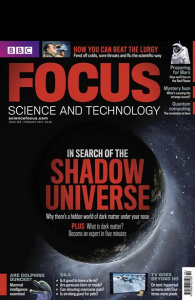Focus Magazine

Review by Oliver V (Engineering Science)
This isn’t a book review as such; it’s a review about a scientific magazine. This is because I wanted to write about what really inspired me to study a science subject and then specifically engineering. When I was at school the only science that I came across (like pretty much everyone else) was in the battered science books handed out by the teachers. No one I knew really read scientific books for fun.
Then came the term where we all applied for university. All of my friends dived into random books that sounded clever and ploughed their way through them. I didn’t, which concerned me at the time but looking back I realise that it was probably for the best – whilst they struggled to understand words and link concepts together that were undergraduate level ready for interviews, I just carried on reading what I’d been reading for a while: science magazines. There are lots and lots of them and for the most part they are absolutely fascinating.
My personal favourite is the monthly BBC magazine called Focus. Reading it rekindles that childhood amazement that everyone has inside them. Every page has details of incredible new inventions, discoveries and achievements; it really does remind you exactly why you chose to do those science subjects when you’re trying to get your head around some complex physics or cell biology late at night. It makes you realise that anyone can achieve great things and will hopefully inspire you to do just that.
The magazine provides an informal insight into the cutting edge technology of today (and even the future) without being patronising. Other interesting parts of the magazines are the columns in which prominent ethical and moral issues surrounding the modern science, for example “should we still be pumping so much of taxpayer’s money into developing a nuclear fusion power station?” One side of the argument is that it won’t be producing economic power for at least 30 years and there are many other things that we could be spending the money on, on the other hand, it could literally solve the global energy crisis. It also gives details of science events (talks, shows etc.) all around the country and around the world.
Other magazines include the National Geographic, Wired and How It Works. They’re all worth a browse: pick whichever style you prefer or whichever one contains an article that particularly interests you.
If you’re even considering studying a science subject at university then I recommend picking up a copy and looking for the stories that interest you, it will spark that flame of enthusiasm for science that everyone has and will provide you with a much broader range of conversation when you have to face the dreaded interview; it’s much better than trying to regurgitate big words that you don’t really understand to someone who probably wrote the book.
Plus you don’t feel bad avoiding homework if you’re reading something scientific.
Visit the website at sciencefocus.com
All of our video book reviews can be seen on our YouTube channel.
